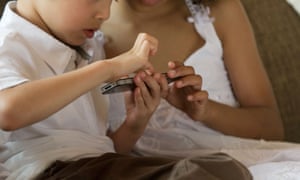A third of preschoolers and two-thirds of primary school-aged
children own smartphones or tablets – and 50% of them are using them
unsupervised, the latest Australian Child Health Poll shows.
The paediatrician Dr Anthea Rhodes, the director of the national poll, said knowing so many very young children were spending too much time on devices was a “worrying” trend.
Rhodes said there was very little evidence to support the idea a smartphone or tablet boosted a toddler’s development. But there was plenty of evidence linking excessive use to health problems.
“Particularly with sleep difficulties, problems related to unhealthy weight gain and then difficulties with social and emotional wellbeing,” she said.
One of the poll’s most significant findings was that almost half of children regularly used screen-based devices at bedtime, with one in four reporting sleep problems as a result.
Two-thirds of families reported family conflict relating to screen
time use and 85% of parents admitted using screens to occupy children to
get things done.
The poll also identified a link between parents’ screen use and their children’s use. “Basically, a parent who has high levels of screen use is more likely to have a child with high levels of use,” Rhodes said. “Three-quarters of parents of children under six also said they do not put time limits on screen use.”
Of any age group, teenagers spend the most amount of time on a screen-based device at home. They average almost 44 hours of use a week – more time than spent in the average full-time job.
Teenagers using screens routinely at bedtime were also more likely to report bullying via social media.
As a paediatrician at the Royal Children’s Hospital Melbourne, Rhodes said she increasingly saw the consequences of such excessive screen and media use in children.
She said physical playtime and face-to-face contact was critical for a young child’s brain and body development.
“Every hour a child spends engaged by themselves on a device like that is an hour they’re not doing something like being physically active or having face-to-face play and social interaction.”
The paediatrician Dr Anthea Rhodes, the director of the national poll, said knowing so many very young children were spending too much time on devices was a “worrying” trend.
Rhodes said there was very little evidence to support the idea a smartphone or tablet boosted a toddler’s development. But there was plenty of evidence linking excessive use to health problems.
“Particularly with sleep difficulties, problems related to unhealthy weight gain and then difficulties with social and emotional wellbeing,” she said.
One of the poll’s most significant findings was that almost half of children regularly used screen-based devices at bedtime, with one in four reporting sleep problems as a result.
The poll also identified a link between parents’ screen use and their children’s use. “Basically, a parent who has high levels of screen use is more likely to have a child with high levels of use,” Rhodes said. “Three-quarters of parents of children under six also said they do not put time limits on screen use.”
Of any age group, teenagers spend the most amount of time on a screen-based device at home. They average almost 44 hours of use a week – more time than spent in the average full-time job.
Teenagers using screens routinely at bedtime were also more likely to report bullying via social media.
As a paediatrician at the Royal Children’s Hospital Melbourne, Rhodes said she increasingly saw the consequences of such excessive screen and media use in children.
She said physical playtime and face-to-face contact was critical for a young child’s brain and body development.
“Every hour a child spends engaged by themselves on a device like that is an hour they’re not doing something like being physically active or having face-to-face play and social interaction.”

No comments:
Post a Comment